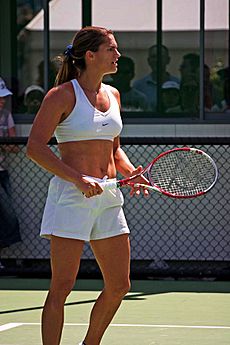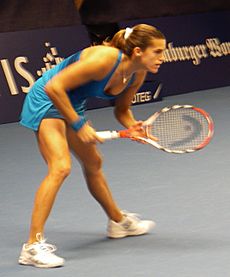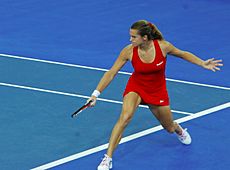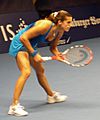Amélie Mauresmo facts for kids
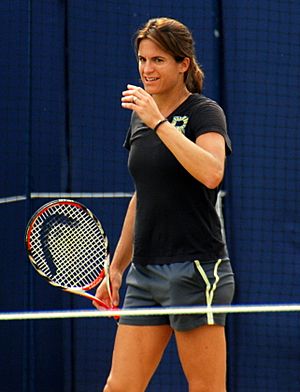
Mauresmo in June 2014
|
|||||||||||
| Full name | Amélie Simone Mauresmo | ||||||||||
|---|---|---|---|---|---|---|---|---|---|---|---|
| Country (sports) | |||||||||||
| Residence | Geneva, Switzerland | ||||||||||
| Born | 5 July 1979 Saint-Germain-en-Laye, France |
||||||||||
| Height | 1.75 m (5 ft 9 in) | ||||||||||
| Turned pro | 1993 | ||||||||||
| Retired | 3 December 2009 | ||||||||||
| Plays | Right-handed (one-handed backhand) | ||||||||||
| Coach | Loïc Courteau (2002–2008) Hugo Lecoq (2008–2009) |
||||||||||
| Prize money | US$15,022,476
|
||||||||||
| Int. Tennis HoF | 2015 (member page) | ||||||||||
| Singles | |||||||||||
| Career record | 545–227 (70.6%) | ||||||||||
| Career titles | 25 | ||||||||||
| Highest ranking | No. 1 (13 September 2004) | ||||||||||
| Grand Slam singles results | |||||||||||
| Australian Open | W (2006) | ||||||||||
| French Open | QF (2003, 2004) | ||||||||||
| Wimbledon | W (2006) | ||||||||||
| US Open | SF (2002, 2006) | ||||||||||
| Other tournaments | |||||||||||
| Grand Slam Cup | QF (1999) | ||||||||||
| Tour Finals | W (2005) | ||||||||||
| Doubles | |||||||||||
| Career record | 92–62 | ||||||||||
| Career titles | 3 | ||||||||||
| Highest ranking | No. 29 (26 June 2006) | ||||||||||
| Grand Slam doubles results | |||||||||||
| Australian Open | QF (1999) | ||||||||||
| French Open | 2R (1997, 1998) | ||||||||||
| Wimbledon | F (2005) | ||||||||||
| US Open | 3R (1999) | ||||||||||
| Team competitions | |||||||||||
| Fed Cup | W (2003) | ||||||||||
| Coaching career (2013–) | |||||||||||
|
|||||||||||
| Coaching achievements | |||||||||||
| Coachee singles titles total | 8 | ||||||||||
| List of notable tournaments (with champion) Wimbledon (Bartoli) |
|||||||||||
|
Medal record
|
|||||||||||
Amélie Simone Mauresmo, born on July 5, 1979, is a famous French former tennis player. She also worked as a tennis coach and is now a tournament director. She was ranked as the world's number one female tennis player by the Women's Tennis Association (WTA) for 39 weeks.
Mauresmo won 25 singles titles on the WTA Tour. These included two major Grand Slam wins: the 2006 Australian Open and the 2006 Wimbledon Championships. She also won the 2005 WTA Tour Championships. In addition, Mauresmo earned an Olympic silver medal in singles at the 2004 Athens Olympics. She was known for her powerful one-handed backhand and strong play at the net.
Mauresmo officially stopped playing professional tennis on December 3, 2009, after a 15-year career. The next year, she began coaching both WTA and ATP players, including former world number one Andy Murray. She was honored by being inducted into the International Tennis Hall of Fame in 2015. In 2021, Mauresmo became the director of the French Open tennis tournament.
Contents
Early Life and Junior Success
Mauresmo was born in Saint-Germain-en-Laye, a town near Paris, France. She started playing tennis when she was four years old. She was inspired after watching Yannick Noah win the 1983 French Open on television. After his win, her parents bought her first tennis racket. In 1998, Noah chose her to be part of the French team for the Fed Cup.
In 1996, Mauresmo won both the junior French Open and Wimbledon singles titles. Because of these wins, the International Tennis Federation named her the 1996 Junior World Champion.
Professional Tennis Career
Becoming a Top Player
In 1999, Mauresmo, who was not expected to win, reached the Australian Open final. She beat three seeded players, including the world number one, Lindsay Davenport. She then lost to the world number two, Martina Hingis, in the final. Mauresmo was only the second Frenchwoman to reach the Australian Open final. She was also only the third Frenchwoman to reach any Grand Slam final during the Open Era. Later that year, Mauresmo defeated Hingis on her way to the final of the Paris indoor event.
2004: Olympic Medal and World No. 1
Mauresmo reached the semifinals at Wimbledon in 2004. She lost to Serena Williams in a close three-set match. She also reached the quarterfinals of the other three Grand Slam tournaments. That year, she won three major titles in Rome, Berlin, and Montreal.
Mauresmo won a silver medal in singles at the Olympic Games in Athens. She was defeated by Justine Henin in the final match.
On September 13, 2004, Mauresmo became the first French tennis player to reach the world number one ranking. This was since computer rankings began in the 1970s. She held that top spot for five weeks. She was also only the second woman, after Kim Clijsters, to become world number one without having won a Grand Slam title yet.
2005: Winning the WTA Tour Championships
Mauresmo reached the quarterfinals of the Australian Open in 2005. There, she was defeated by Serena Williams, who went on to win the tournament.
At the French Open, Mauresmo was seeded third. However, she was upset in the third round by 17-year-old Ana Ivanovic in three sets. Mauresmo had beaten Ivanovic earlier that year at the Australian Open.
At the US Open, Mauresmo lost in the quarterfinals to Mary Pierce. This followed a semifinal loss to Lindsay Davenport at Wimbledon.
Mauresmo won her first singles title at the WTA Tour Championships. She defeated Mary Pierce in the final.
2006: Two Grand Slam Titles
At the Australian Open, Mauresmo won her first Grand Slam singles title. She defeated former world number one players, Kim Clijsters and Justine Henin, on her way to the title. Both opponents had to stop playing their matches due to injuries or illness. Mauresmo was leading in both matches when they retired.
Mauresmo then won her next two tournaments. She won the Open Gaz de France tournament in Paris, beating Mary Pierce in the final. She also won the Proximus Diamond Games in Antwerp, Belgium, defeating Kim Clijsters.
At the Qatar Open in Doha, Mauresmo beat Martina Hingis in a semifinal. However, she lost to Nadia Petrova in the final. Even though she lost, this result helped Mauresmo return to the world number one ranking on March 20, 2006.
Mauresmo then reached the semifinals of the Miami Open. There, she lost to Svetlana Kuznetsova, who became the champion.
Mauresmo lost in the fourth round of the French Open to Czech teenager Nicole Vaidišová. She then had a first-round loss at a Wimbledon warm-up tournament. However, Mauresmo and Kuznetsova won the doubles title there.
Mauresmo was the top seed at Wimbledon. She defeated Anastasia Myskina in a quarterfinal and Maria Sharapova in a semifinal. She then came back from one set down to defeat Henin in the final. This victory was Mauresmo's second Grand Slam singles title and her first on grass courts. She was also the first Frenchwoman since Suzanne Lenglen to win Wimbledon. She is still the most recent woman to win Wimbledon using a single-handed backhand.
She then had to withdraw from some tournaments due to a groin injury. At the US Open, Mauresmo lost to Sharapova in the semifinals.
Mauresmo reached the final of the China Open, losing to Kuznetsova. She finished the year ranked world number three.
2007: Challenges and Injuries
Mauresmo started 2007 with a quarterfinal loss at the Sydney International. At the Australian Open, Mauresmo lost in the fourth round.
Mauresmo's next tournament was the Open Gaz de France, where she lost in the semifinals. In her next tournament in Antwerp, Mauresmo defeated Kim Clijsters in the final. This was Mauresmo's third win in a row there. This earned her a special diamond-encrusted racquet trophy.
On March 16, 2007, Mauresmo received the Chevalier of the Légion d'honneur award from President Jacques Chirac.
Mauresmo had to withdraw from several tournaments due to appendicitis. She lost in the third round of the German Open and in the second round of the Rome Masters. At the French Open, Mauresmo lost in the third round.
After losing to Henin in the final of a tournament in Eastbourne, Mauresmo went into Wimbledon hoping to win another major title. However, she lost her fourth-round match. This loss caused her ranking to drop outside the top five for the first time since 2003.
Mauresmo withdrew from the US Open due to not being fit enough. She later lost in early rounds at several other tournaments.
2008: A Difficult Year
In 2008, Mauresmo lost in the quarterfinals of her first tournament. At the Australian Open, she lost in the third round. She also reached the quarterfinals in Paris and Dubai.
Mauresmo then lost in the third round of two major events in Indian Wells and Miami. On clay, she lost in the quarterfinals. At the French Open, Mauresmo lost in the second round.
At Wimbledon, Mauresmo lost in the third round to two-time former champion Serena Williams. Mauresmo said she was not 100% healthy during the match. She later declined to play in the Olympic Games due to injury.
After a two-month break, Mauresmo returned to play. She reached the semifinals of two tournaments before the US Open. At the US Open, Mauresmo lost in the fourth round.
On September 29, Mauresmo announced that she would no longer work with her long-time coach, Loïc Courteau. She ended the year ranked world number 24.
2009: Final Year and Retirement
At the Brisbane International tournament in 2009, Mauresmo reached the semifinals before having to stop due to injury. At the Australian Open, Mauresmo lost in the third round.
Mauresmo won her first tournament since 2007 by defeating Elena Dementieva in the final of the Open Gaz de France tournament in Paris.
Mauresmo lost in the third round of the Indian Wells Open. She then lost in the fourth round at Key Biscayne. However, she won the doubles event there with her partner Svetlana Kuznetsova.
At the Madrid Masters, Mauresmo reached the semifinals, losing to Caroline Wozniacki. Mauresmo lost in the first round of the French Open.
Mauresmo was the 17th seed at the 2009 Wimbledon Championships. She won her first three matches. Her fourth-round match against the top seed Dinara Safina was historic because it was the first time the new roof closed due to rain during a match. Mauresmo lost the match.
At the 2009 US Open, Mauresmo was the 17th seed but lost in the second round.
On December 3, 2009, Amélie Mauresmo officially announced her retirement from tennis at a press conference in Paris. She ended her career ranked world number 21.
Coaching Career
Early Coaching Roles
In June and July 2010, Mauresmo briefly coached fellow French player Michaël Llodra during the grass court season. On November 7, Mauresmo ran her first marathon in New York City.
In 2012, Mauresmo joined the team of Victoria Azarenka, who was then the world number one. Mauresmo helped Azarenka as a support coach.
Coaching Grand Slam Champions
In 2013, Mauresmo started coaching French player Marion Bartoli. She joined Bartoli's team shortly before the 2013 Wimbledon Championships. With Mauresmo's help, Bartoli won her first Grand Slam title at Wimbledon without losing a single set. Bartoli said Mauresmo helped her career greatly.
On June 8, 2014, it was announced that Mauresmo would be the new coach of Andy Murray. Under her coaching, Murray reached the 2015 Australian Open final. He also won his first career titles on clay courts, including the 2015 Madrid Open, where he beat Rafael Nadal on clay for the first time. Murray also reached the semifinals of the French Open and Wimbledon. Mauresmo took a break after Wimbledon in 2015 because she gave birth to her son.
In 2016, Mauresmo was back coaching Murray. He reached his fifth Australian Open final that year. Mauresmo's last tournament as Murray's coach was the 2016 Madrid Open. The next day, May 9, 2016, Mauresmo announced she was stepping down as Murray's coach.
At the same time, she was the captain of the France Fed Cup team since 2013. After the 2016 final, which her team lost, she announced she was leaving that role due to her second pregnancy.
In June 2018, she was chosen to be the captain of the France Davis Cup team. However, she later decided not to take this position. Instead, she chose to coach French player Lucas Pouille for the 2019 season.
Under Mauresmo's coaching, Pouille reached the semifinals of the 2019 Australian Open. He had never won a match there before. Mauresmo and Pouille stopped working together in October 2020.
Playing Style and Strengths
Mauresmo was an aggressive tennis player who used the whole court. She was known for her excellent technique. Her strongest shot was her one-handed backhand, which was one of the best on the WTA tour. She could hit her backhand with power, spin, or slice. Her backhand often won her many points. Her forehand was sometimes less consistent, but she improved it over her career.
Her serve was powerful, often reaching speeds of 107 miles per hour (172 km/h) and sometimes as high as 116 miles per hour (187 km/h). This allowed her to hit many aces. Her second serve was also reliable, usually around 92 miles per hour (148 km/h), so she did not make many double faults.
Mauresmo was one of the best net players on the WTA Tour. She often chose to finish points at the net. She was excellent at hitting volleys, showing great touch and a variety of shots. She was also good at the serve-and-volley tactic, especially on grass courts. She was an aggressive returner, standing close to the baseline to hit powerful returns.
Despite her great skills, Mauresmo's biggest challenge was sometimes her confidence and nerves. However, her game was effective on all types of court surfaces, and she won tournaments on hard, clay, grass, and indoor courts.
Grand Slam Performance
Even though Mauresmo was a top player for many years, she did not win a Grand Slam tournament until 2006. People sometimes criticized her for getting nervous in these big events. For example, in two Wimbledon semifinals, she lost after being in a strong leading position. Before winning the 2006 Australian Open title, she was often called "the greatest women's player never to win a Grand Slam." After winning the 2006 Wimbledon title, Mauresmo joked, "I don't want anyone to talk about my nerves anymore."
Mauresmo is one of several tennis players to have reached the world's top ranking without first winning a Grand Slam singles title. Other players who did this include Kim Clijsters, Ivan Lendl, Jelena Janković, and Caroline Wozniacki.
Personal Life
On August 16, 2015, Mauresmo announced that she had given birth to a baby boy named Aaron. She later gave birth to her daughter, Ayla, on April 26, 2017.
Mauresmo was one of the final torch runners at the 2024 Summer Olympics opening ceremony in Paris.
Equipment and Endorsements
Mauresmo's clothing and shoes on the court were made by Nike, and later by Reebok. In the early 2000s, she used a Dunlop 200G+1.00 racquet. Later, she switched to HEAD racquets.
Images for kids
See also
 In Spanish: Amélie Mauresmo para niños
In Spanish: Amélie Mauresmo para niños
 | Ernest Everett Just |
 | Mary Jackson |
 | Emmett Chappelle |
 | Marie Maynard Daly |


